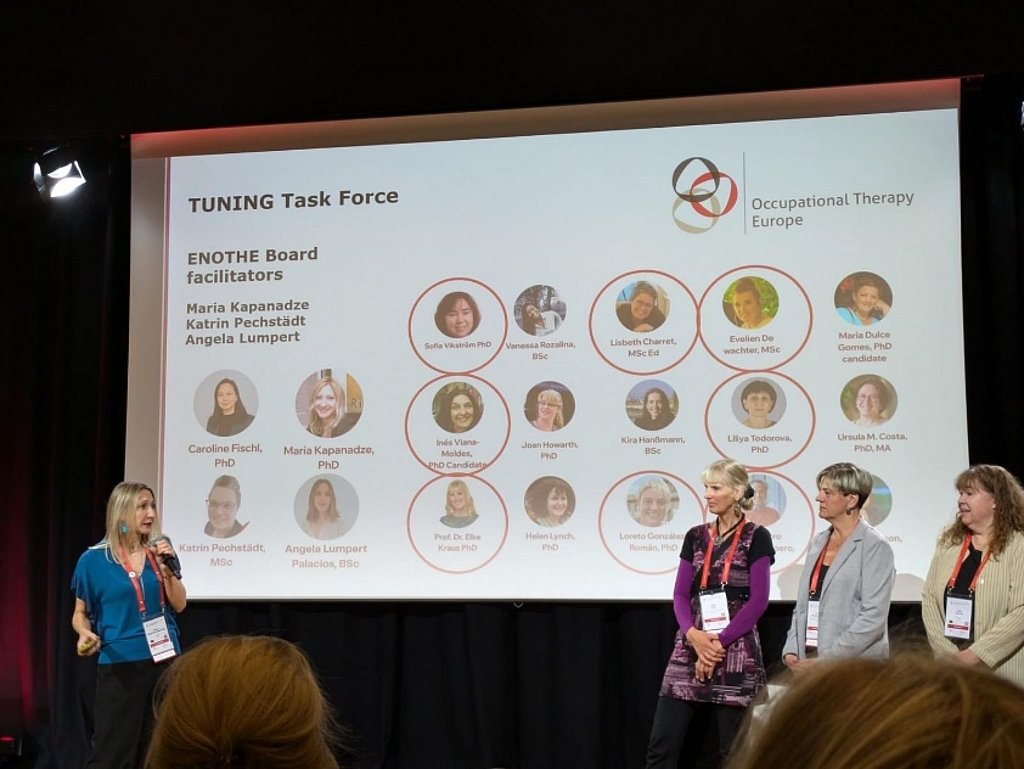Occupational therapy is a relatively young and still little-known profession. It "supports and accompanies people of all ages who are restricted or at risk of being restricted in their ability to act" with the aim of ensuring that they are involved in areas of life that are meaningful to them through occupation and optimizing their participation. "Specific activities, environmental adaptation and counseling serve to enable people to act in everyday life, participate in society and improve their quality of life." (DVE 08/2007)
It is a profession that is located at the interface of human action. A profession that always focuses on the person and what they do, can or could do, and what they want or need to do - in the cosmos of unique and multi-layered physical, socio-cultural and temporal contexts.
All over the world, occupational therapists are trained at university level - Germany is an exception here, as it is the only country in Europe where training in occupational therapy, physiotherapy and speech therapy takes place at vocational colleges, still under occupational therapy laws from 1976.
Since the turn of the millennium, it has been possible to study occupational therapy in Germany after completing vocational school training (so-called additive) or while integrating or accompanying training. The future model for regular higher education training, as has been the international standard for decades, is a primary qualification. This was possible thanks to a model clause from 2009 to 2024 - and ASH Berlin is one of the few state universities to offer such a course, which is also interdisciplinary. However, the academization of occupational and physiotherapy is progressing very slowly, as not even 5% of occupational therapists are qualified at university level.
Against this background, it is all the more important to develop and maintain an international perspective in occupational therapy (and physiotherapy) so that the multifaceted knowledge and professional research findings from other countries can be incorporated into studies.
In October, the first congress for occupational therapy across Europe was organized for the first time by OT Europe (OT = Occupational Therapy) as the umbrella organization of COTEC (Council of Occupational Therapy for the European Countries), ENOTHE (European Network of Occupational Therapy in Higher Education) and ROTOS (Research in Occupational Therapy and Occupational Science Foundation).
ASH-Prof. Dr. Elke Kraus was in Krakow, Poland, from October 15 to 18, 2024. She is part of the ENOTHE Tuning Taskforce, which deals with the Europe-wide standards of higher occupational therapy education at Bachelor's, Master's and PhD level, and organized two workshops on the topic there.
The conference offered participants a special opportunity to gain an insight into European occupational therapy and to network with occupational therapists from all over Europe. Important and more than just a side note: occupational therapy can be regularly qualified at university level in all European countries - Germany is sadly at the bottom of the league here.
The topics were organized around professional practice and professional policy as well as education and science under the congress motto: Future-Proofing Occupational Therapy.
The following topics were covered in particular: New trends and fields of activity; mental health; physical health; training/qualification; interdisciplinary interventions and approaches; occupation-focused research and research methods; public health; students and research as well as quality development.
Prof. Dr. Kraus will continue to participate in the ENOTHE Task Force and will be particularly involved in the development of doctoral programs in Europe for occupational therapy.
Wrong German special path
It is to be hoped that the therapy professions in Germany will continue to become more academic. On January 1, 2025, the experimental model clause, in which universities were allowed to qualify therapists (occupational therapy, physiotherapy and speech therapy), will end with several evaluations. These showed that it is not only possible for universities to train therapists, but absolutely necessary in view of the growing complexities.
However, instead of a welcome full academization in which all therapists receive a basic university education, a partial academization is emerging. In the future, vocational schools and universities will train different therapists who are to work in the same professional field. This is to be regulated by future amendments to professional legislation. A look beyond the international horizon shows how occupational therapy can actually develop - it would be good and necessary for Germany to take inspiration from the many examples of best practice there for the future of its therapy professions!



